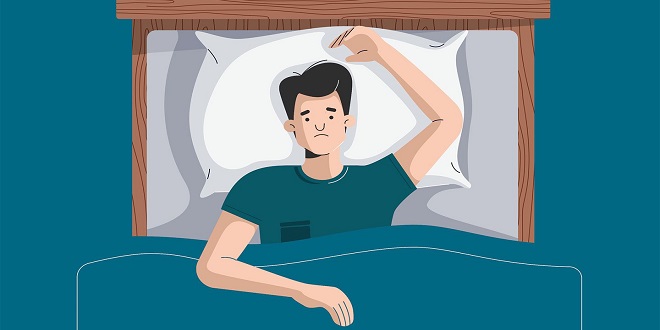Everything You Need to Know About Insomnia

What keeps you from sleeping at night? Do you ponder deep questions? Is there an overwhelming excitement about some big trip? Or, is there an approaching deadline for an unfinished project that is stressing you out?
It might also be a dreaded family gathering occasion, or you might have an upcoming test. For many people, this kind of stress is only temporary and it vanishes quickly the very moment it has been resolved.
But what happens if the very thing that is keeping you awake and stressing you out revolves around the stress of losing sleep?
The stress of stressing out over lost sleep is situated at the core of insomnia. Apparently, insomnia is an unsolvable loop – it also happens to be one of the most common global sleep disorders.
What Causes Insomnia?
Different factors contribute towards causing the occasional restless night. For instance, a snoring partner, emotional stress, and physical pain are some of such factors. Sometimes, extreme sleep deprivation, such as jetlag, can completely disrupt one’s biological clock and consequently wreak havoc on one’s sleep schedule.
Nonetheless, in most cases, sleep deprivation lasts for a short time. Eventually, mental and physical exhaustion catches up, causing us to fall asleep. However, due to some long-term conditions, such as gastrointestinal issues, respiratory disorders, and other health-related issues, one’s physical and mental fatigue can get overpowered.
With the piling up of sleepless nights, the brain starts associating the bedroom and the bed, in particular with restless nights – wracked with agony and anxiety. Before bedtime, insomniacs can feel utterly stressed out to the extent that their brains feel hijacked, affecting the response system and flooding the body with flight-or-fight chemicals.
Triggered by the body’s flight-or-fight response, adrenocorticotropic and cortisol hormones start coursing through the bloodstream, ultimately increasing blood pressure and heart rate. Resultantly, the body gets jolted into hyperarousal. When the body and nervous system are in this condition, the brain automatically starts to hunt for potential threats, which makes it impossible to ignore nighttime noises and other slight discomforts.
In case you don’t know, the primary energy source for our brains comes from cerebral glucose. During sleep, our metabolism slows down in an attempt to conserve glucose for the time when we are awake and active. When insomniacs finally succeed at falling asleep, the quality of their sleep becomes greatly compromised.
According to PET (Positron Emission Tomography), the adrenaline rush that usually prevents insomnia-affected people from falling asleep, also increases their metabolic rate. In simple words, if insomniacs manage to fall asleep, their bodies and minds are still working overtime, which is why their brain’s supply of energy-producing glucose keeps burning out.
How Does Insomnia Affect the Mind & Body?
The poor sleep quality of insomniacs renders them no benefit as they feel stressed, anxious, exhausted, and even confused after waking up. This process keeps them in a constant loop of mental and physical exhaustion as it keeps repeating all over again.
When such cycles of anxiety, restlessness, and stress last several months, the affected people are diagnosed with chronic insomnia. While this sleep disorder rarely causes death, it can lead to a shorter life span, poor quality of life, chronic mental exhaustion, and anxiety attacks usually found in individuals suffering from anxiety and depression.
So, suffering from any of these conditions can increase the risk of overall health decline.
Fortunately, there are ways to break the cycle of insomnia and poor sleep. People suffering from insomnia can benefit from stress management and curb the hyperarousal of their minds and body. Stress management is also one of the best-understood treatments for insomnia.
The Importance of Hygienic Sleep Practices
Good and hygienic sleep practices can also help rebuild one’s relationship with bedtime. Firstly, you will have to ensure that your bedroom is dark, cool (in the summer), cozy in winter, and overall comforting to diminish the potential “threats” at night during hyperarousal. You should also check out memory foam mattress reviews in case your bedding needs an upgrade.
You should prioritize using your bed for sleeping only. This is particularly important if you are working from home. Avoid working from your bed, but set up a dedicated workspace so that your brain associates bed with sleeping only. If you get restless at night and cannot bring yourself to sleep, leave your bed or the bedroom, and tire yourself out by doing something else, such as reading a book, journaling, or meditating.
An efficient way to regulate your metabolism is by setting your alarm for consistent sleeping/ resting and waking times to help orient your body’s internal biological clock. This internal biological clock is also known as the circadian rhythm, which happens to be sensitive to light as well. That said, shut off or put away all tech gadgets at least one hour before bedtime.
This way, you will avoid bright light at night and help your body with the production of melatonin and eventually tell your body that it is time to sleep. Apart from these practices, some doctors prescribe medications to aid their patients to sleep; however, not all medications are reliable for all cases. Not to mention that over-the-counter pills can be highly addictive as well and can even worsen the symptoms following a withdrawal.
That said, before seeking medical self-treatment, you must ensure that your sleeplessness and restlessness at night are actually caused by insomnia itself.
Final Thoughts
Sometimes, insomnia isn’t caused by stress but due to a condition known as DSPD (delayed sleep phase disorder). The circadian rhythm of people with DSPD is significantly longer than 24-hours, which is why the affected people don’t sync with the traditional sleeping habits. People with DSPD might have difficulty falling asleep at the traditional bedtime, but they can sleep comfortably at their delayed sleep schedule. There is a delicate balance between our waking and sleeping cycles. While many of us take sleep for granted, the truth is that sleeplessness and restlessness at night can lead to serious mental and physical wellness issues. If you feel restless at night, start practicing good sleep hygiene each night.





